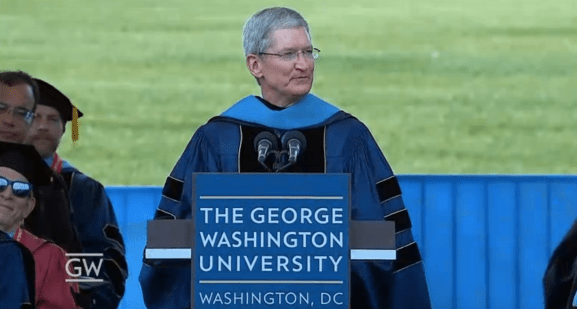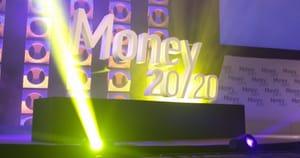
Apple chief executive Tim Cook delivered the commencement address to the graduating class of George Washington University today. His speech spoke directly of justice, injustice, and his optimism that values belong in the workplace.
Cook mentioned Martin Luther King, Jr. three times in his address, including at the very beginning and at the very end. He called King and former president John F. Kennedy two of his early heroes from childhood, at a time and place in Alabama, where Cook grew up, where those two were not held in high regard by most of the people around him.
The ceremony took place on the National Mall in Washington, D.C., not far from the base of the Washington Monument, which was visible directly behind the stage. The university said that it expected a crowd of 25,000, including about 6,000 graduates of the university.
“It was here that Dr Martin Luther King challenged Americans to make real the promise of democracy,” Cook began. “It was here that President Ronald Reagan called on us to believe in ourselves, and to believe in our capacity to perform great deeds.”
Cook told an anecdote of how he first visited Washington in 1977, when he was sixteen, after winning an essay contest. Before traveling to the nation’s capital, he and other Alabama students visited Montgomery, where they met with then-governor George C. Wallace — who had opposed desegregation in the 1960s.
He got to meet with Governor George C. Wallace before leaving for D.C. – the same Wallace who opposed segregation in the 1960s.
“Meeting my governor was not an honor for me,” Cook said. “Shaking his hand felt like a betrayal of my own beliefs. It felt wrong, like I was selling a piece of my soul.”
In Washington, he said, he got to meet President Jimmy Carter, and he contrasted Carter and Wallace: both from the South, both governors or former governors, but very different in their values.
“Carter was kind and compassionate. He held the most powerful job in the world, and had not sacrificed any of his humanity,” Cook said.
Between Wallace and Carter, Cooks said, “It was clear to me that one was right and one was wrong.”
Cook went on to say that it is important to remain true to your values.
“It’s about finding your values, and committing to them. It’s about finding your North Star. It’s about making choices. Some are easy. Some are hard. And some will make you question everything.”
Twenty years after his trip to Washington, Cook said, “I met someone who made me question everything. … That was Steve Jobs.”
It was 1998. Jobs had founded Apple, been forced out, and had recently returned “to find it in ruins,” as Cook put it.
“He didn’t know it at the time, but he was about to dedicate the rest of his life to rescuing it and to leading it to heights greater than anyone could imagine.”
“His vision for Apple was for a company that could turn powerful technology into tools that were easy to use. Tools that could help people realize their dreams and change the world for the better.”
At the time, Cook said he had retained his values, but kept them out of the work sphere. “I felt work was work,” Cook said, and it was important to be professional and valueless in work. That left him feeling “adrift and rudderless,” like Apple, Cook said.
“Steve didn’t see it that way. Steve was an idealist. He convinced me that if we worked hard, and made good products, we too could change the world.”
“I took the job, and it changed my life,” Cook said. “It has been 17 years, and I have never once looked back.”
He continued by saying how Apple retains an optimism that its products can improve the world.
“At Apple, we believe that work is not about improving your own self. It’s about improving others’ lives as well.”
For example, he said, the company’s technologies can help blind people read. It can help people who live in remote areas stay connected. And, with an indirect reference to many recent videos of police brutality, Cook talked about smartphones’ roles in social justice.
“People who witness injustice and want to expose it — and now they can, because they have a camera in their pocket all the time.”
Cook continued:
We believe that a company that has values and acts on them can really change the world. And an individual can too. That can be you. That must be you.
Graduates, your values matter. They are your North Star. Otherwise it’s just a job — and life is too short for that.
You don’t have to choose between doing good and doing well. It’s a false choice, today more than ever. Your challenge is to find work that pays the rent, puts food on the table, and lets you do what is right and good and just.
Find your North Star. Let it guide you in life and work and in your life’s work.
Now I suspect some of you aren’t buying this. I won’t take it personally. It’s no surprising that people are skeptical — especially here in Washington. … A healthy amount of skepticism is fine, but too often in this town it turns to cynicism. …
Maybe that’s just the world that we live in. But graduates, this is your world to change.
Before closing, Cook took a moment to point out some of the values of Apple and of Silicon Valley. (He did, however, note that he is a “proud son of the South” and that he will always love the South.)
In Silicon Valley, he said, people believe that any problem can be solved, no matter how difficult. There is “a very sincere sort of optimism.”
This extends to Apple, as well, Cook said.
“A friend of mine at Apple likes to say that the best way to solve a problem is to walk into a room full of Apple engineers and proclaim ‘This is impossible.’ I can tell you, they will not accept that — and neither should you.”
“Great progress is possible, whatever line of work you choose. There will always be cynics and critics on the sidelines, tearing people down. And just as harmful are those people with good intentions who make no contribution at all.”
Cook cited King’s “Letter From a Birmingham Jail,” which referred to the “appalling silence of the good people,” and urged people to get off the “sidelines” and into active work pursuing justice, health, and more.
The sidelines are not where you want to live your life. The world needs you in the arena. There are problems that need to be solved. Injustices that need to be ended. People that are still being persecuted. Diseases still in need of cure.
No matter what you do next, the world needs your energy, your passion, your impatience for progress.
Don’t shrink from risk. And tune out those cynics and critics. History rarely yields to one person — but think, and never forget, what happens when it does.
That can be you. That should be you. That must be you.
Before leaving the podium, Cook took out an iPhone 6 and snapped a photo of the crowd.
Cook himself is a graduate of Auburn University in Alabama, and delivered a commencement speech at his alma mater in 2009. He was also named to the State of Alabama’s “Engineering Hall of Fame” the same year.
Cook had some distinguished acts to follow. The student speaker, Capt. Richard Ruiz, is the son of Mexican immigrants, a Marine, and a decorated veteran of active service in Afghanistan. Also receiving honorary degrees were Anthony Fauci, director of the National Institute of Allergy and Infectious Diseases at the National Institutes of Health, and Carole M. Watson, the former acting chair of the National Endowment for the Humanities. Fauci saved someone’s life the previous evening, by administering the Heimlich maneuver, during a dinner honoring the commencement speakers and honorary degree recipients.
GWU grads were delighted to discover Cook mingling among them prior to the ceremony, and posted a few photos to Twitter of the famous CEO.
Such an incredible honor meeting my true hero @tim_cook at #gwcommencement #OnlyatGW #Apple #Love http://pic.twitter.com/2Ms5pUO2vA
— Gidon Feen (@gidonfeen) May 17, 2015
#gwu commencement speaker Tim Cook meeting the Colonials. #gwcommencement. http://pic.twitter.com/0AoWYy1bk7
— lorraine voles (@lovoles) May 17, 2015
Hey, it’s @tim_cook! #GWU15 #GWCommencement http://pic.twitter.com/CVJnqCj6wq
— Hassan Ahmed (@hassanahmed120) May 17, 2015
More information:
Powered by VBProfiles
VentureBeat’s VB Insight team is studying marketing and personalization…
Chime in here, and we’ll share the results.
More information:
Powered by VBProfiles
Originally published on VentureBeat » Dylan Tweney: http://ift.tt/1LbG6bw
